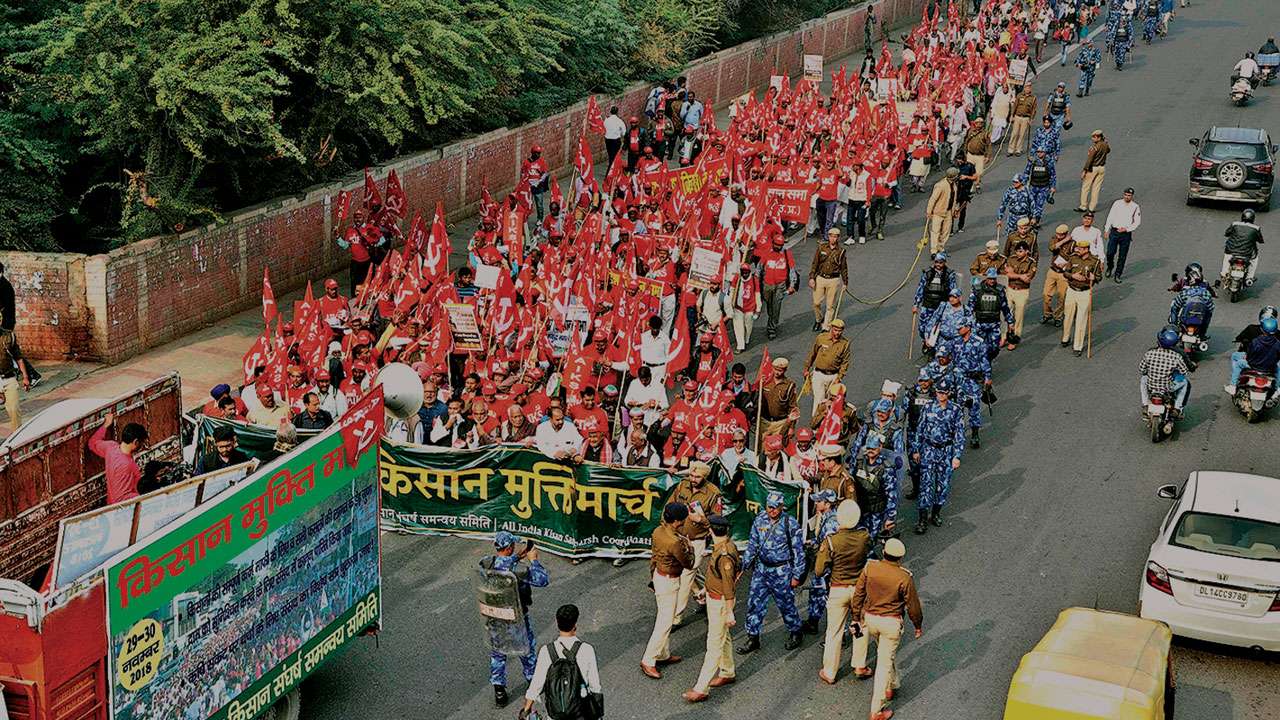
Over 300,000 farmers’ suicides in the past two decades have not moved governments, nor has it touched the conscience of the average citizen.
The agitations in 2018 by All India Kisan Sangharsh Coordination Committee (AIKSCC), an umbrella of 209 organisations, and its constituents, whose rallies ranging from Nasik to Mumbai and finally Kisan Mukti March in Delhi on November 29 and 30, ensured that farmers’ issues and concerns became top priorities for the nation.
The dissent of the farmers resulted in the change of guard in the Hindi heartland, which got the ruling dispensation thinking. All political parties are trying to woo the farmers and the issue of agrarian crisis has taken centre stage.
Farmers have reason to believe that their legitimate demands may see light of the day in 2019.
Though the government, after being in power for four-and-a-half years, is still exploring ways and means to resolve the crisis, it has done nothing to debate the two legislations presented by AIKSCC through its members in Parliament.
These bills, i.e. Freedom from Debt and Guaranteed MSP as per Swaminathan Report, are a precursor to get agriculture back on track.
Since 21 political parties, mainly from the Opposition, have pledged support and promised to pass the bills if elected, it will be interesting to see whether the NDA government will convene a special session of Parliament to do the same.
On one hand, the Opposition, including the Congress party, has decided to follow the path of loan waiver promised by Prime Minister Narendra Modi in his election speeches, the PM now seems to have had a change of heart and now insists that waiver is only a lollipop. There are indications that the central government is now trying to bring in the Telangana scheme wherein farmers are given Rs 4,000 per acre before the Kharif season and an equal amount before the Rabi sowing.
Instead of fulfilling the promise of guarantee of MSP, the government could also go with the Madhya Pradesh Bhavanter scheme wherein farmers are to be paid the difference between the MSP and the market price at which they have sold their produce.
Neither of the schemes can be accepted as an alternative to the two bills. The Telengana scheme is only a bonus whereas the farmers’ demand for a complete loan waiver by the Centre remains.
The Bhavanter scheme, which originated through an order by the Allahabad High Court in November 2000, may be a good idea, but its implementation as in MP was a disaster.
The Prime Minister, by promising debt waiver and comprehensive MSP, caught the imagination of the farmers who voted for him, and his failure to comply with the promises has not gone well with the farmers who have started shifting their affiliations from the BJP.
If the prime minister wants to retain his hold over the farmers, he would have to find a way out to address the promises made by him. On one hand, the government faces the big challenge to provide debt relief, and on the other to ensure that the farmer gets enough for his produce, so that he can avoid the debt trap again.
Let us see the major challenges before the farmers in the coming year and how they can be resolved. Even if the two bills see the light of day, the loss of crop due to natural calamities would also have to be addressed separately.
The much-publicised Pradhan Mantri Fasal Bima Yojna (PMFBY) is the best thing that happened to farmers and will take care of the crop loss, is nothing but a falacy. The PMFBY has been designed to favour the corporates.
In the past three years of its inception, the nine-odd companies have already made a profit of over Rs 60,000 crore while the farmers who lost their crops on account of natural calamity were not compensated.
The scheme has a clause that the unit for compensation would be the entire village and not an individual farmer. If the crop of the entire village is destroyed and even one farmer’s crop remains intact, the compensation will not be paid to anyone in the village. This flaw has to be rectified as the premium to the insurance company is paid by an individual farmer.
The farmer faces challenges from government authorities in the name of land acquisition. Earlier, on one hand, land was bought at reduced rates, and on the other, it was sold to builders at very high rates. Therefore, in 2013, the central government introduced the new Act which ensured payment of two times the circle rate in urban areas and four times the circle rate in rural areas.
State governments across the country are making life miserable for the farmers by trying to forcibly eject them from their lands in the name of acquisition without following the due process of law.
The legal process of acquiring land by issuing notifications, seeking consent, payment as per schedule by passing awards etc. is being ignored, and the 2013 Act is being diluted through government orders.
Classic is the case of Madhya Ganga Canal in western Uttar Pradesh, where farmers today are being coerced into signing agreements to sell their land for lesser amounts in favour of the State, which is in violation of the 2013 Act.
About 50 million families are dependent on sugarcane, yet they are the most neglected as they invariably get their cane dues after a year. This year, UP farmers are yet to get their cane dues for the previous season.
This is a 70-year-old issue and no government, either at the Centre or the state, has been able to resolve this crisis despite more than one-fourth of the country’s farmers and labourers being involved. This is an irony.
Author is a farmer and a politician